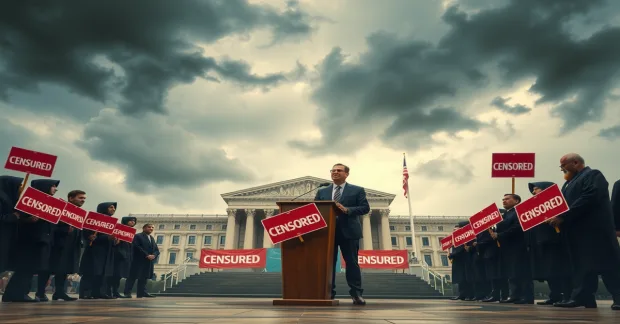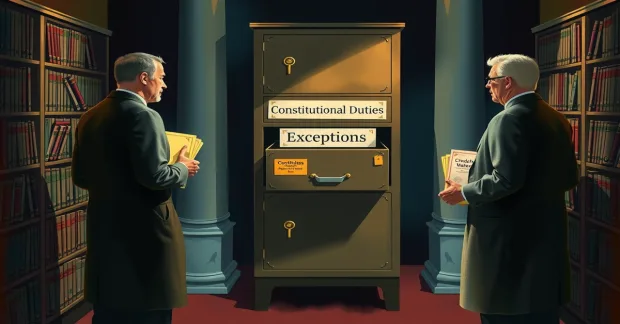
It’s your right at stake when gun registration moves from recordkeeping to control. Ask yourself: Is registration about safety or seizure? History shows registration often precedes restrictions and sometimes confiscation. You must weigh your privacy against promised safety and expanding governmental access. Stay informed, demand limits, protect your freedom.
Key Takeaways:
- Registration risks creating searchable owner databases — could local records become a national registry?
- History shows registration often precedes restrictions, bans, and forced buybacks.
- Who accesses your firearm records — law enforcement, federal agencies, or hackers?
- If criminals won’t register, why should law‑abiding owners surrender privacy and control?
- State-level registries can be combined de facto into a federal database with data sharing.
- Registration ties names to serial numbers — is that permission or a path to prohibition?
- Protect anonymity: fight registrations that enable tracking, seizure, or bureaucratic permission slips.
Understanding Gun Registration

Definition and Purpose of Gun Registration
You’ll find gun registration means recording a firearm’s serial number, make, model, and owner contact. Governments pitch it for tracing stolen guns and improving investigations. In many states, registries also track private transfers or required permits. Note: no universal federal registry exists, yet state lists are expanding. Ask yourself: is this paperwork about public safety or a path to control?
Historical Context of Gun Registration Laws
You’ve seen registration measures morph into broader controls in states like California, Maryland, Massachusetts, and parts of Florida. Small reporting rules later supported bans, waiting periods, and forced buybacks. Those case studies show how lists can be repurposed for new limits. That history pushes this question: is registration the paper trail before confiscation?
Registries convert dispersed ownership into actionable lists that officials can query by model, county, or purchase date. Once compiled, those lists enable targeted enforcement, selective prohibitions, and coordinated buybacks. You should ask: when your serial number is stored, how quickly could it be used in future orders?
Recent Trends in Gun Registration Legislation
You’re watching a push this decade for expanded state registration schemes, often labeled “common-sense” safety. Legislators propose mandatory reporting of private sales, transfers, and lost firearms. Modern data systems make cross-state aggregation easier. State registries are quietly growing, raising serious concerns about federal or multi-jurisdictional access. Who gains power when databases become searchable with a few keystrokes?
On the tech side, cloud storage and interoperable records let agencies compile state files into a virtual national resource. Data breaches and doxxed owners have already exposed registries. Remember: NICS runs background checks, not a public ownership registry, yet combined state records plus federal queries create a real pathway toward centralized control.
The Argument for Gun Registration
Proponents say registration helps law enforcement trace firearms used in crimes and disrupt straw purchases. You are told registration creates accountability, improves stolen-gun recovery, and supports targeted interventions. Do you trust data-driven policies to reduce shootings? States often frame registries as modest, low-cost tools that enable faster investigations. Supporters point to improved traceability and better crime solving as the main benefits.
Advocates’ Perspective on Public Safety
Advocates argue registration lowers crime by making illegally trafficked guns easier to trace. You hear examples of faster leads after a recovered firearm is entered into a registry. They cite law enforcement casework where serial-number traces narrowed suspect pools. They claim registries reduce straw purchases and link guns to crimes faster, helping prosecutors secure convictions and deter repeat offenders.
Data and Statistics Supporting Registration
Several academic studies and police reports are cited to support registration, including analyses showing improved solve rates. You are presented with links to journal articles and DOJ reports that analyze trace data and registration effects. Analysts often point to comparative studies across states to argue that registries correlate with lower firearm diversion. They use evidentiary claims to justify policy changes.
For context, the FBI’s NICS performs roughly 40 million background checks each year, showing scale of data systems. You should weigh whether larger databases mean better prevention or bigger vulnerabilities. Law enforcement points to trace-data increases after registry adoption in some counties, while critics note inconsistent methodology across studies. Data can support both safety claims and warnings about misuse.
Differentiating Between Registration and Confiscation
Registration is legally distinct from confiscation, but it can create enforceable ownership records. You must understand how California, Maryland, Massachusetts, and parts of Florida moved from registration to restrictions and buybacks. Lawmakers write rules that redefine ownership, and registries make enforcement feasible. Registries can be used later to identify and seize firearms.
Practically, an owner registry lets officials match names to serial numbers for orders or warrants. You should note how regulatory definitions like “assault weapon” changed in past state laws, turning legal guns into banned items. Courts sometimes upheld targeted seizures under emergency rules. Once identity data exists, enforcement pathways become simpler.
The Fears Surrounding Gun Registration
Concerns about Government Overreach
You see state registries quietly expand, often labeled “common-sense measures.” Many of your neighbors don’t know there is no federal registry yet. When multiple state databases combine, they can form a national firearm database accessible to law enforcement. Ask yourself: “If they can see every registered gun you own, how far are we from an order to collect them?”
The Slippery Slope Argument
You’ve watched registrations morph into bans and buybacks in California, Maryland, and Massachusetts. Advocates warn it’s not accidental. Each law was pitched as limited, then widened. That historical pattern fuels your doubt: registration can precede confiscation.
Look at how language changed over time: “temporary” bans became permanent limits. Officials introduced grandfather clauses, then later removed them. Lawmakers also used serial-number databases to enforce transfers and initiate buybacks. You should ask: who benefits when your ownership record is centralized?
Psychological Impacts on Gun Owners
You may feel exposed when your name links to a serial number in a registry. Breaches and leaked lists have already doxxed owners. That exposure breeds anxiety, reduces trust in institutions, and changes how you store or transport firearms. Ask yourself: will registration make you a target?
Behavior changes follow registration laws. You might avoid background checks, prefer private sales, or skip ranges to stay off records. Some owners change storage habits or carry decisions out of fear. Those shifts can undermine safety programs and community training. Consider the trade-off between compliance and personal security.
Comparing Gun Registration to History
Historic cases and outcomes
| Case | Outcome |
|---|---|
| Nazi Germany (1930s) | Registration and licensing were used to disarm Jews and opponents, enabling targeted seizures. |
| Australia (1996) | Port Arthur reforms led to a national buyback of about 650,000 firearms and stricter registration. |
| United Kingdom (1996–97) | Dunblane triggered a handgun ban and the surrender of hundreds of thousands of handguns. |
| New Zealand (2019–20) | Christchurch laws produced a ban and roughly 56,000 surrendered firearms during buyback rounds. |
| U.S. state examples | California, Maryland, Massachusetts, and some Florida localities saw registration precede bans and buybacks. |
Historical Examples of Registration Preceding Confiscation
Look at Australia and New Zealand: registration and new laws quickly led to mandatory buybacks and mass surrenders. You should note how registries made owners easy to find. Governments used lists to send notices and collect firearms. Those cases show paperwork can become a practical tool for removal.
Lessons from Other Countries’ Experiences
You must see the pattern: registration centralizes ownership data, then policy narrows rights. Centralized lists enabled fast enforcement in each example. Ask yourself: is a registry a neutral database or an operational roadmap for seizure?
Digging deeper, you find timelines matter. Australia moved from law change to buyback in months. New Zealand enacted bans within weeks after the attack. Registries let officials identify owners by serial number and address. Once centralized, data was reused for enforcement and compliance checks.
The Role of Registration in Totalitarian Regimes
History shows authoritarian governments used registration as a surveillance and control tool. You see registrations turned into lists for targeted disarmament of political opponents and minorities. That pattern warns you registration can be weaponized against citizens.
In practice, regimes revoked licenses, issued confiscation orders, and used local records to locate firearms. You should note how easily administrative rules became coercive measures. When ownership equals a searchable target, your ability to resist removal weakens.
The Second Amendment and Gun Rights

Constitutional Foundations of Gun Ownership
You rely on the plain text: “the right to keep and bear arms shall not be infringed.” Federal law and the Supreme Court reinforce that right. In 2008, District of Columbia v. Heller (5-4) recognized an individual right to possess firearms for home defense. In 2010, McDonald v. Chicago (5-4) applied that right to the states. You should note that both rulings left room for some regulations, while affirming your core right.
Interpretations of the Second Amendment
Courts split over how broad your right really is. You saw Heller affirm individual possession, then Bruen in 2022 shift analysis to a history-and-tradition test (6-3). Lower courts now weigh historical analogues when judging modern laws. If registration lacks a historical counterpart, you can expect legal challenges.
More detail: Heller allowed longstanding prohibitions, like bans for felons and laws for public safety. Bruen requires governments to show historical analogues for new firearm rules. You should know many registration statutes are modern, post-20th-century laws. That timing gives you a foothold for constitutional attack when courts demand historical precedent.
Current Legal Battles over Registration Laws
Plaintiffs argue registration is a slippery slope to confiscation and a practical infringement of your rights. Defenders claim registration aids investigations and crime prevention. You face a patchwork of outcomes, with state registries expanding while courts issue conflicting rulings across circuits.
More detail: multiple federal cases now contest state registration statutes on Bruen grounds. Some district courts have enjoined registration rules. Other courts have upheld them. You should watch for circuit splits that could prompt Supreme Court review, since a final ruling could determine whether registration survives strict constitutional scrutiny.
The Privacy Implications of Gun Registration
When your name is tied to a firearm serial number, you lose anonymity as a law‑abiding citizen. State registries are expanding while federal policy stays fluid. With roughly 400 million civilian firearms in circulation, centralized records become powerful. Ask yourself: who benefits when your ownership is searchable? Law enforcement access, private subpoenas, or hacker intrusions can turn registration data into control points you cannot undo.
Personal Data Risks in Registration Systems
Registration forms commonly collect your name, address, date of birth, ID numbers, purchase date, and serial numbers. Stored together, these fields create a precise profile that can be cross‑referenced with other databases. In states like California and Maryland, registries already hold detailed ownership logs. That aggregation makes you a target for doxxing, targeted harassment, or civil process.
Data Breaches and Their Impact on Gun Owners
Breached registries can expose owners to threats, theft, and reputational harm. When lists leak, activists and criminals alike can find you. You face risks ranging from harassment to violent targeting. Past leaks of sensitive public records show how quickly contact details spread online, and gun owners are especially vulnerable.
More than privacy loss, breaches create operational danger. Leaked ownership data lets burglars scout high‑value homes and thieves plan entry. Registries sold on the dark web become permanent records you cannot erase. In hostile political climates, exposed lists can also accelerate regulatory actions like targeted enforcement or localized buybacks.
The Intersection of Privacy Rights and Gun Ownership
Your ownership sits at the crossroads of privacy law and the Second Amendment. Courts have split on how much registration impinges on liberty. You must weigh state security claims against your right to private possession. Ask: should a constitutional right require a searchable ledger?
Practical harms follow legal ambiguity. If states share data or federal access expands, your local registry can form a national picture of ownership. Once that picture exists, it becomes easier for policymakers to propose broad actions that affect you directly. That risk shapes every argument against mandatory registration.
Political Perspectives on Gun Registration

The Role of Political Parties in the Gun Debate
You’ve watched parties split sharply over registration. Republicans often frame registry laws as the first step to confiscation. Democrats and left-leaning lawmakers promote registration as a tool for enforcement and crime prevention. In states like California, Maryland, and Massachusetts, party-backed rules expanded registration and then led to bans, restrictions, or buybacks in some areas. Ask yourself: “Is this safety measure or a power grab?”
Lobbying Efforts and Campaign Financing
You should note heavy spending by interest groups on both sides. Powerful organizations like the NRA and Everytown deploy lawyers, ads, and lobbyists. After Sandy Hook and Parkland, those groups amplified pressure and donations. Lobbying targets committees, statehouses, and ballot initiative campaigns. Who benefits when your ownership is recorded?
Ballot fights show how money and messaging sway voter opinion. In Washington, I-1639 proved ad buys can determine results. State-level lobbying also funds legal challenges to registration laws. Industry PACs and grassroots networks funnel donations into candidate races. You must watch campaign finance reports and PAC filings closely to see influence patterns.
Public Opinion and Its Influence on Legislation
You know public sentiment shifts sharply after mass shootings. After Parkland, Florida passed major reforms within months in 2018. Poll spikes and viral campaigns push governors and legislators to act fast. Search trends and social media amplify pressure on elected officials. Do you trust polls to protect your rights?
Local ballot measures often decide contested firearm rules. Voter turnout and enthusiasm can flip outcomes for or against registration. Lawmakers track emails, calls, and polling before voting on bills. Your vote, calls, and organized pressure shape whether registration becomes law. Engage at the ballot box if you want to protect your rights.
Alternative Solutions and Proposals
You can support measures that cut violence without a registry. Focus on safe-storage incentives, targeted law enforcement, hospital violence intervention, and community outreach. Programs like Cure Violence and street outreach have shown large, local reductions in shootings when properly funded. Encourage technology such as biometric safes and trigger-lock distribution, plus expanded training and mental-health crisis response. Ask: do these steps protect your rights while reducing harm, without creating a centralized database of owners?
Exploring Non-Registration-Based Safety Approaches
You should prioritize practical tools over paperwork. Offer tax credits or rebates for biometric safes and certified lockboxes, fund free trigger-lock programs, and expand safe-storage public campaigns. Evidence from voluntary initiatives shows millions of distributed safety devices can lower accidental discharges and unauthorized access. Pair these with improved background-check enforcement at points of sale, not ownership lists. Ask yourself: would incentives and technology make your family safer without handing over ownership data?
Community-Based Initiatives for Gun Safety
You can back local violence-interruption teams that mediate conflicts before shots are fired. Programs in multiple cities used focused outreach and mentorship to reduce shootings significantly in concentrated hotspots. Invest in street outreach, mentoring, and job-placement partnerships that reconnect at-risk individuals to stable futures. These programs protect neighborhoods while keeping you free from invasive owner tracking.
Community teams deploy credible messengers who gain trust in high-risk networks. They interrupt retaliation cycles, mediate disputes, and link participants to housing, jobs, and counseling. Data-driven targeting directs resources to specific blocks, maximizing impact. For example, focused outreach has cut shootings by large percentages in pilot areas. You benefit because these efforts reduce violence while avoiding registry-based control of lawful owners.
Educating Gun Owners on Responsible Use
You should require and fund standardized, state-recognized safety courses that emphasize storage, situational awareness, and legal responsibilities. Encourage range-based live-fire training and scenario drills, plus free basic courses at community centers. Certified instruction reduces mishandling and accidental injury. Provide vouchers or discounts to ensure broad uptake. Ask: wouldn’t widespread, mandatory safety education protect your family more than collecting ownership records?
Effective education combines classroom law modules with hands-on range time and safe-storage demonstrations. Instructors cover de-escalation, legal use-of-force thresholds, and childproofing strategies. Gun shops and ranges can partner with organizations to offer discounted multi-hour courses, plus free lock distribution. You gain competence, confidence, and community trust without giving authorities a searchable list of your firearms.
Case Studies of Gun Registration Laws
You should study concrete examples where gun registration led to new controls or buybacks. Ask yourself: does a registry become a roadmap to confiscation? These cases show when paperwork preceded restrictions, who kept the data, and what rules changed after registration programs began.
- 1. California (Roberti‑Roos 1989; Prop 63, 2016): state banned many assault weapons, created registration windows, and expanded background records. The state enforces a 10‑day transfer reporting rule for many sales.
- 2. Maryland (Firearm Safety Act, 2013): law banned certain rifles and limited magazines to 10 rounds. The act tightened licensing and increased state tracking of regulated firearms.
- 3. Connecticut (Post‑Sandy Hook, 2013): required owners to register now‑banned assault weapons within months. State officials used that data to enforce compliance and seizures in extreme cases.
- 4. Massachusetts: long‑standing licensing and registry requirements mean you need state permission for many guns. The state maintains persistent records for transfers and lost firearms.
- 5. New York (SAFE Act, 2013): expanded the definition of assault weapons and tightened transfer reporting. It created new databases and stronger penalties for noncompliance.
- 6. Australia (National Firearms Agreement, 1996): federal buyback removed about 650,000 firearms. Registration and buyback show how paperwork turned into collection at scale.
Examination of Specific States with Registration Laws
Look at California, Maryland, Connecticut, Massachusetts, and New York. You will see similar patterns. Laws first required reporting or registration. Then new bans, limits, and enforcement powers followed. Those shifts show how a registry can be repurposed.
Evaluating the Outcomes of These Laws
Measure outcomes by arrests, seizures, compliance rates, and registry growth. You should watch the data on transfers, confiscations, and privacy breaches. Those metrics show whether registration reduced crime or expanded government control.
In California and New York, registration and reporting coincided with stepped‑up enforcement. In Connecticut and Maryland, registration targets were later linked to purchase limits and seizure authority. Australia’s buyback returned roughly 650,000 guns to government custody, showing how registration data aided large‑scale collection. You should compare crime statistics before and after, plus registry breach incidents, to judge real impact.
Public Reactions and Resistance to Registration
You and fellow owners reacted with lawsuits, protests, and noncompliance. Gun clubs, sheriffs, and state legislators often pushed back. Public resistance slowed some registry expansions and forced legal challenges.
In many states, sheriffs publicly refused to enforce registry mandates. Grassroots groups organized civil disobedience and legal defenses. You saw ballot fights and litigation that challenged both the laws and the data practices behind them. Those reactions reveal how registry proposals create sustained political and legal firestorms.
The Role of Advocacy Groups
Gun Rights Organizations and Their Missions
You know the major players: the NRA, Gun Owners of America, and the Second Amendment Foundation. The NRA claims about 5 million members and directs heavy lobbying and state-level support. Gun Owners of America mobilizes a focused base of roughly 200,000 activists. The Second Amendment Foundation, founded in 1974, has filed dozens of lawsuits defending your rights. Together they fund litigation, run outreach, and back sympathetic candidates at state houses. Who will protect your gun rights when politicians shift?
How Advocacy Groups Campaign Against Registration
They attack registration through three main avenues: lawsuits, lobbying, and mass public campaigns. Groups file immediate injunctions when states propose registries, slowing enforcement. They lobby legislators, draft model anti-registry bills, and pressure local officials. Advertising buyouts, email blasts, and weekly call campaigns mobilize tens of thousands. Sheriff partnerships and legal defense funds add practical resistance on the ground. That coordinated push makes registration politically costly for lawmakers.
More than a dozen states now bar state-run registries, often after lobbying by these groups. Pro-gun coalitions helped pass anti-registry statutes across state houses in recent cycles. They also fund local lawsuits that halted registration rules within weeks in several cases. You see rapid legal fights because groups keep ready legal teams and war chests. An early injunction can stop data collection before records exist, protecting your privacy and liberty.
Building Grassroots Movements for Gun Rights

You encounter grassroots work at gun clubs, county meetings, and church halls. Groups recruit volunteers, train spokespeople, and organize town-hall turnouts. Many local chapters run phone banks and precinct programs before legislative sessions. Dozens of county resolutions opposing registration show the tactic’s effectiveness. Those local wins translate into state pressure and electoral consequences for proponents.
They use targeted voter lists, direct mail, and social media ads to reach likely voters. Volunteer canvasses and persistent testimony at hearings sway undecided lawmakers. In tight state chambers, flipping a few seats can block registry bills. You become a force when you show up, call officials, and mobilize neighbors.
Future Perspectives on Gun Registration
You should watch how state registries expand and interconnect. There is still no universal federal registry, yet state databases are growing. In several states registration began as a safety measure and later led to restrictions, bans, or buybacks. Ask yourself: is registration about crime prevention, or is it a legal roadmap toward confiscation? Courts, legislatures, and data risks will decide how your rights are affected.
Potential Changes in Legislation
Dozens of bills now propose tighter tracking, mandatory registration, or broader reporting to law enforcement. Lawmakers in multiple states have introduced measures tying registration to licensing, storage mandates, or transfer reporting. Executive actions and interagency data sharing could make state lists accessible nationwide. If those bills pass, your purchase records may no longer stay local.
The Evolving Landscape of Gun Rights
Since the 2022 Supreme Court Bruen ruling, legal tests for gun limits changed, shifting disputes to lower courts. You should track how judges apply Bruen to registration laws. States like California and Maryland show how registration can anchor stricter rules. Watch appointments and state court rulings; each opinion can expand or narrow your protections.
Case law now matters more than ever for your ownership rights. Lower courts differ on whether registration is a permissible regulation or an unconstitutional burden. You will see challenges arguing that registration is a prior restraint on a constitutional right. Keep an eye on pending appeals and injunctions that could shield owners from registry enforcement.
Predictions for Gun Ownership Trends

If registration spreads, you may see a rise in private transfers that avoid official records. NICS checks surged after 2020, showing how policy drives purchasing behavior. Expect increased demand for secure storage, trust-based transfers, and legal services protecting owners. Manufacturers may shift to models easier to document or conceal from registries.
Ownership patterns will likely diverge by region and demographic. Urban registration pressure could reduce visible ownership, while rural areas cling to higher carrying rates. You might notice more purchases of untraceable parts and increased interest in legal workarounds. Monitor state policy shifts; they will shape where and how you keep your firearms.
Debunking Myths About Gun Registration
You’ve heard claims that registration lowers murder rates or inevitably leads to confiscation. Research and history show a mixed picture. Four states — California, Maryland, Massachusetts, and parts of Florida — began with registration and later added restrictions. There is still no universal federal registry. So you must weigh data against precedent, not slogans.
Misconceptions About Registration and Crime Rates
You’ve been told registration equals less crime. Empirical links are weak and often confounded. Studies usually show correlation, not causation. Cities changed police tactics, laws, and budgets simultaneously. For example, registration in some states did not prevent later bans, transfers, or buybacks. So you should demand clear evidence, not slogans.
Addressing Myths Surrounding Confiscation Fears
You fear registration leads to forced seizures. History shows it can enable government action when combined with bans. In four states registration expanded into restrictions and buybacks. But registration alone is not a seizure order. Still, once your name is in a database, you face increased vulnerability.
Look at the mechanics: a registry gives officials serial numbers tied to names. That enables targeted orders, search warrants, and takedown lists. Data breaches and leaked registries have already doxxed owners. When a ban appears, registries make buybacks and enforcement logistically simple. You must question any law that creates a centralized list of lawful owners.
Clarifying the Goals of Gun Control Advocates
Advocates say registration improves investigations and prevents mass shootings. Their proposals often pair registration with universal background checks and red flag laws. You should note that those policies shift power to courts and agencies. So ask: who controls the criteria, and who enforces them?
Consider the process: registration plus inter-state data sharing creates a functional national list. Law enforcement and federal agencies can access state databases with a few keystrokes. You must evaluate whether those systems include safeguards, audit trails, and strict access limits. Without such protections, registration becomes a tool for control rather than a safety measure.
The Impact of Technology on Gun Registration
Ask yourself: if registries become digital and linked, how protected is your privacy or your property? State databases now run on cloud servers and connect to law enforcement networks in seconds. You face centralized, searchable records that can be queried across jurisdictions. At the same time, technology can return positive effects, like faster recovery of stolen firearms. Still, the main risk remains clear: once your name is tied to a serial number in a networked system, control over that data can shift quickly.
Digital Tracking and Its Implications
Today, RFID tags, QR codes, and GPS-enabled safes can make firearms locatable in real time. Police already use mobile apps to log recovered guns. You should note the danger: a single query could reveal every registered firearm you own. On the positive side, tech can aid theft recovery and evidence linking. Yet the balance tilts if access expands beyond local law enforcement to state or federal systems without clear limits.
Advancements in Registration Techniques
States are moving from paper records to cloud databases, photo-linked registrations, and electronic transfer portals. Ballistic databases like NIBIN tie shell casings to crime scenes. Some lawmakers promote microstamping or mandatory serial QR codes for traceability. You face systems designed for efficiency that also make aggregation and cross-referencing trivial, raising the specter of coordinated seizures if policy shifts.
In practice, electronic portals speed background checks and private-transfer reporting. For example, dealer upload portals can ingest thousands of records weekly. You should consider how automated matching can flag owners for review. Meanwhile, proposals for blockchain-style registries aim to prevent tampering, but they also create immutable logs tied to your identity. That permanence benefits record integrity and worries owners about future policy changes.
The Role of AI and Big Data in Tracking
AI can cross-reference registrations with DMV, tax, and criminal databases to produce risk scores. Predictive models can flag owners for audits or alerts. You must understand that algorithms learn from biased inputs, so false positives are likely. On the other hand, agencies tout AI for prioritizing violent crime investigations. The core concern is automation turning paperwork into actionable orders without human review.
Deployments already show how analytics change policing workflows. For instance, machine scoring could trigger warrantless queries or removal notices after a single algorithmic flag. You should worry about opacity: vendors rarely publish model specifics. At the same time, advocates argue AI cuts investigation time and links crime guns faster. The danger remains that algorithmic outputs, not judges, could drive enforcement priorities.
Final Words
Considering all points, you must weigh whether registration is administrative or a prelude to removal. Ask yourself: who gains power when your gun ownership is digitized and centralized? You deserve laws that protect rights, not paper trails that invite control. If registration can lead to lists, lists can lead to orders. Stand informed, protect your privacy, and demand clear limits on data access.
FAQ
Q: Is gun registration really the first step toward confiscation?
A: Registration creates a list linking owners to firearms. That list can be used to target lawful owners later.
Q: If every gun is registered, who controls the registry and who can access it?
A: Control depends on state law and agency policy. Centralized or shared access increases federal reach and local enforcement power.
Q: Haven’t some states used registration as a prelude to bans and buybacks?
A: Yes. Several states enacted registration then imposed bans, restrictions, and buyback programs on specific firearms.
Q: Does registration threaten privacy, safety, or anonymity for lawful gun owners?
A: Registration ties names to serial numbers and addresses. Data breaches, leaks, and doxxing have exposed owner lists before.
Q: Why should law-abiding citizens be punished for obeying registration when criminals won’t comply?
A: If criminals refuse to register, only compliant owners are tracked and targeted. That creates unequal burden and actionable lists.
Q: Is mandatory registration compatible with the constitutional right to keep and bear arms?
A: Many scholars argue registration burdens the right to keep and bear arms. Courts have avoided a definitive national ruling.
Q: What practical steps protect owners’ rights and privacy without surrendering firearms?
A: Oppose mandatory registries at the state level. Push laws limiting data retention, access, and sharing. Consult firearms attorneys for transfers and records.


















